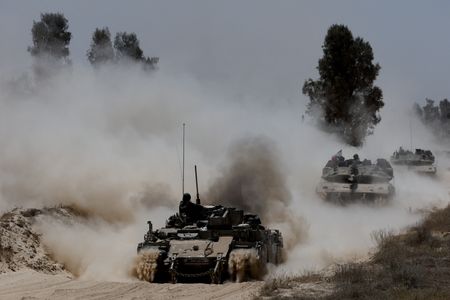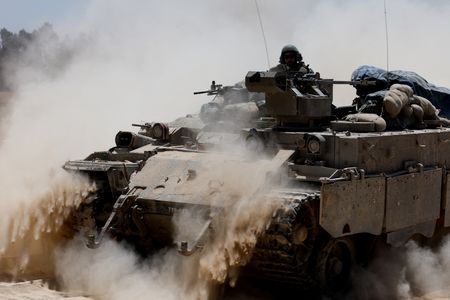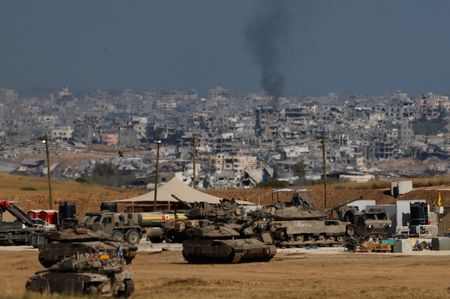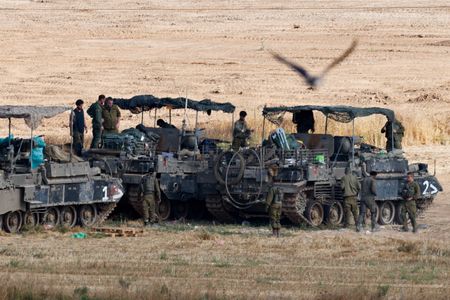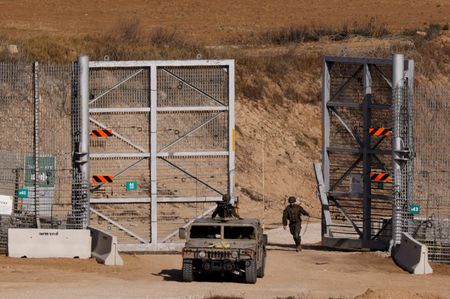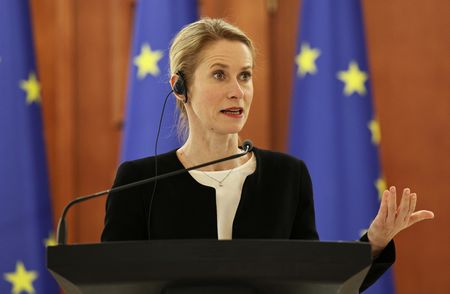By Nidal al-Mughrabi and May Angel
CAIRO/JERUSALEM (Reuters) -Israeli forces killed at least 55 Palestinians in airstrikes in Gaza on Tuesday, local medics said, continuing to bombard the enclave despite mounting international pressure to halt military operations and allow unimpeded deliveries of aid.
Britain announced it was suspending trade talks with Israel and summoning its ambassador over “egregious policies” in the occupied West Bank and Gaza, while European Union foreign policy chief Kaja Kallas asked for a review of the EU-Israel trade deal, according to Dutch news agency ANP.
The war, now in its 20th month, has left Gaza in ruins and its population facing a worsening hunger crisis. It has strained Israel’s relations with much of the world and those with its closest ally, the United States, now appear to be wavering.
The United Nations said no humanitarian aid has been distributed yet in Gaza, despite more supplies being dropped off on the Palestinian side of the Kerem Shalom crossing after Israel eased its 11-week-old blockade on Monday.
“Today, one of our teams waited several hours for the Israeli green light to collect supplies. Unfortunately, they were not able to bring those supplies into our warehouse,” said U.N. spokesperson Stephane Dujarric.
Separately, indirect ceasefire talks between Israel and Hamas militants in Qatar appeared to falter again, with Israeli Prime Minister Benjamin Netanyahu saying he had decided to bring back the senior negotiating team from Doha for consultations.
Hamas accused Netanyahu of entering the talks in bad faith, pretending to participate in a bid to mislead global public opinion. “No real negotiations have taken place since last Saturday,” the Palestinian Islamist group said in a statement.
18 DEAD IN AIRSTRIKE ON TWO HOMES, MEDICS SAY
Israel conducted further airstrikes on Tuesday across the densely populated enclave and medics said the sites hit included two homes where women and children were among the 18 dead, and a school housing displaced families.
Israel’s military, which on Monday warned those in the southern Gaza city of Khan Younis to evacuate to the coast as it prepared for an “unprecedented attack”, had no comment. Israel says Hamas uses civilian buildings for cover; Hamas denies this.
In Gaza City, Reuters footage showed men, women and children sifting through the rubble of the Daraj neighbourhood school where they had been sheltering, and where charred pieces of clothing and a red teddy bear lay among scattered belongings.
At nearby Al-Ahli Hospital, men said prayers over bodies wrapped in white shrouds, before carrying them to their graves.
“What is our fault? What is the fault of children? What is the fault of the women we found on the stairs with their hair and clothes torn and burned?” said Omar Ahel, who had been sheltering at the school. “By God, this is injustice.”
Israeli strikes have killed more than 500 people in the past nine days as the military campaign has intensified, Gaza medics say.
SANCTIONS
British Prime Minister Keir Starmer told parliament he, along with the leaders of France and Canada, was “horrified” by Israel’s military escalation, repeating calls for a ceasefire.
The three nations had warned on Monday of “concrete actions” against Israel if it did not stop military operations in Gaza and lift restrictions on aid.
In addition to suspending trade talks, Britain announced sanctions against a number of individuals and groups in the Israeli-occupied West Bank over alleged violence against Palestinian residents.
Israeli Foreign Ministry spokesperson Oren Marmorstein said Britain had failed to advance free trade negotiations for some time and called the sanctions “unjustified and regrettable”.
“External pressure will not divert Israel from its path in defending its existence and security against enemies who seek its destruction,” Marmorstein posted on X.
Israel’s ground and air offensive has displaced nearly all Gaza’s 2.3 million residents and killed more than 53,000, according to Gaza health authorities.
The campaign began after Hamas-led militants attacked Israeli communities near Gaza’s border in October 2023, killing about 1,200 people and seizing 251 hostages, according to Israeli tallies.
‘EVERYTHING’S EMPTY’
The hunger crisis in Gaza deepened after Israel imposed a blockade on supplies from March 2. The territory is facing a critical risk of famine, a U.N.-backed hunger monitor said earlier this month.
On Monday, Israel cleared nine trucks for entry into Gaza, and on Tuesday the United Nations said it had received permission from Israel for about 100 aid trucks to enter, though they had yet to be distributed.
The U.N. says Gaza needs at least 500 trucks of aid and commercial goods every day. Throughout the war, trucks with aid have waited weeks and months at Gaza’s border to enter.
Louise Wateridge of the U.N. Palestinian refugee agency UNRWA said on Tuesday there was little food left.
“Everything’s empty. The warehouses, the distribution centres, they’ve been empty for weeks,” she said, speaking from a warehouse in Jordan that she said had food for 200,000 people that could be driven to Gaza in just a few hours.
Israel’s leadership has insisted that it can free remaining hostages and dismantle Hamas through stepped-up military action. Hamas has said it would free the hostages in exchange for an end to the war and the release of Palestinians in Israeli jails.
(Reporting by Nidal Al-Mughrabi in Cairo, Alexander Cornwell in Tel Aviv, James Mackenzie and May Angel in Jerusalem; additional reporting by Emma Farge in Geneva, John Irish in Paris, Hussam al-Masri and Dawoud Abu Alkas in Gaza; writing by Alexander Cornwell; editing by Aidan Lewis and Mark Heinrich)

